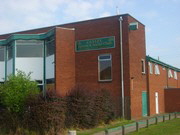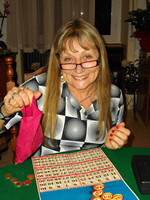Interview with Bob Brolly - BBC Local Radio
Club Historians Write Up on BBC local radio interview (Coventry and Warwickshire) about her book -
Not Just Beer and Bingo! A Social History of Working Men’s Clubs
September 12th 2012
I’ve said this before and I’ll say it again- it’s a busy life being a Club Historian!

Wednesday September 12th and Ruth is up and about early, heading towards her home city of Coventry, armed with her presentation to be given at Coventry Central Library on a memory stick, printed out notes and a dozen or so copies of her recently published book on working men’s clubs.
First stop upon arriving in Coventry is the local BBC radio station where Ruth has been asked to give an interview about her book, her talk and the state of clubs in Coventry more generally. The show is the very popular Bob Brolly lunchtime show.
Bob is known for his laid back, chatty style of presenting and for encouraging listeners to phone in, send emails and texts. Today he has made Coventry’s working men’s clubs the main topic of the first hour of the show.
Bob is keen to ask Ruth about her experience of Coventry clubs, as a local woman who grew up right next to a club which, as she so often says, was like an extension of her family’s living room. After explaining her interest in clubs, which emerged from her own personal experience, Ruth talks about when she first noticed clubs going into decline, in the early 1980s and her decision to research and document their history and development. ‘Life got in the way… I ended up writing about other things,’ she says. (Those ‘other things’ being mostly related to her years in China, but that is another story!)
Finally, in the early noughties, she settled down into looking at clubs, first of all intending to
write about the ‘club across the street’, the Canley Social.
She then widened the scope to all of Coventry’s 40 odd clubs and then to writing about the whole of the club movement right across the country. ‘That is why it took me so long’, she confessed. A national movement with at one time over 4000 clubs, and 150 years of history, is a big task for one person to take on but she finally got there.
Bob is an experienced club man himself, having played in a band for many years in most of the clubs around Coventry and the surrounding area. He drew upon his own experience quite a lot during the interview with many lively memories. He referred to many works social and sports clubs, such as the Standard Triumph club and Masseys (Massey Ferguson tractor factory- now long gone) which are not strictly speaking working men’s clubs but come under another category. Their set up was different to CIU clubs though they appear very similar. There were many of these in Coventry during the heyday of clubs, and operated alongside the CIU clubs, offering many activities and a good night out but with more of an emphasis on sports such as football and cricket.
Bob was playing at the Willenhall Social club when a strike at Peugeot, a major employer in the area, was announced. He told of how the club, which was packed as they used to be at weekends, suddenly emptied once the news about the strike was announced.
This strong link between clubs and the fortunes and losses of major industries partly explains why clubs in the city started emptying more generally over the years, from the mid-1970s onwards. So when Bob said he thought it was bingo that killed the clubs, Ruth disagreed.  Bingo did, after all, bring in a lot of money for clubs and enabled them to undertake refurbishments and to offer a whole range of activities for their members. There were downsides to bingo, of course, but the loss of manufacturing industry and jobs was probably a more major reason for the closure of around half of Coventry’s clubs, according to Ruth. This view was supported later on in the phone-in by Doug who had decades of experience in Coventry clubs, including 30 years as Secretary at the Coachmakers Club (which is still open, by the way.)
Bingo did, after all, bring in a lot of money for clubs and enabled them to undertake refurbishments and to offer a whole range of activities for their members. There were downsides to bingo, of course, but the loss of manufacturing industry and jobs was probably a more major reason for the closure of around half of Coventry’s clubs, according to Ruth. This view was supported later on in the phone-in by Doug who had decades of experience in Coventry clubs, including 30 years as Secretary at the Coachmakers Club (which is still open, by the way.)
Bob pointed out that, ironically, on the day of this interview and Ruth’s library talk, Coventry’s oldest club and also one of the very first in the country, was being knocked down. He saw it on the way into the work that morning. Coventry WMC dated back to 1860 but closed down in August 2008 due to financial troubles. Bob felt that this was indeed a sad occasion to see this historic and iconic club being leveled – history and reputation couldn’t save it so what about other clubs- had they got a future?
Ruth offered an optimistic yet realistic response, as she normally does. Clubs must adapt or die, to become more modern and accept that crowds don’t beat a path to their doors anymore. People stay home more for entertainment as there is now much more on offer than 40 years ago. But she insisted that there was still a need for communal entertainment, not just home alone with TV/DVD/PC type of activities. People still enjoyed a good night out with friends and families and clubs that offer value for money entertainment in a contemporary setting but with old-fashioned friendliness and camaraderie, will do well.
Bob referred to a few in the local area that were, indeed, faring well such as the Bedworth Ex-Servicemen’s Club. They don’t all need to close down if they face the challenge and provide a pleasant place to go for families and continue offering a venue and facility for local communities.
